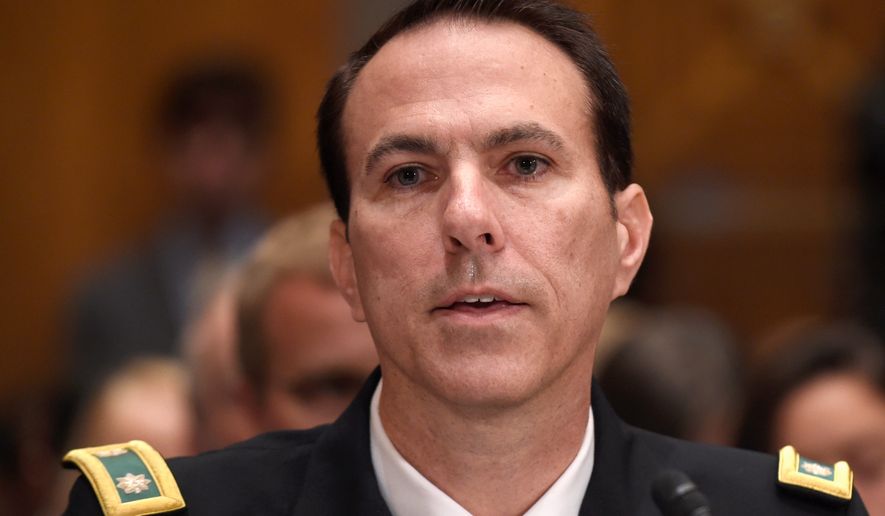A Green Beret war hero, whom the Army had banished from his Pentagon office for whistleblowing to Congress about what he considered a failed hostage rescue policy, has been cleared of wrongdoing and allowed to retire.
Lt. Col. Jason Amerine, no longer shunned and his security clearance restored, was honored Friday with a Legion of Merit at a Pentagon retirement ceremony.
He later announced the news on Facebook.
“When I began speaking to Congress in 2013, some form of retaliation was inevitable because our First Amendment right to speak to Congress is so often disregarded,” he wrote. “It was Greek tragedy that a senior Army officer dragged the Army ignominiously into this by initiating the illegal investigation. The hostage issues I raised had nothing to do with the Army and everything to do with broken institutions at the agency level that refused to admit their faults. At least the fratricide was not lethal this time.”
It was an embarrassing episode for the Army and the FBI, which appeared to be trying to imprison an Afghanistan war hero for exercising his right to talk to a member of the House Armed Services Committee, in this case Rep. Duncan Hunter, California Republican.
An A Team leader, then-Capt. Amerine was one of the first Americans to invade Afghanistan in October 2001. He fought along side Hamid Karzai, the future president, as a band of Green Berets and Afghan militiamen drove toward Kandahar. A friendly fire bombing wounded Col. Amerine and broke up the group.
He went on the write a book, teach at West Point and make television appearances. He eventually found himself in an Army unit at the Pentagon devoted to winning the release of hostages, including accused deserter Sgt. Bowe Bergdahl.
Col. Amerine witnessed firsthand what he considered a muddled hostage policy with lots of agencies involved but no single leader.
Mr. Hunter arranged a meeting with the FBI in hope the bureau would listen. Instead, agents went to the Army brass and said they suspected Col. Amerine had supplied classified information to the congressman.
The Army promptly fired Col. Amerine from his hostage policy job and ordered the Army Criminal Investigation Command to investigate him.
The Pentagon inspector general did not support Col. Amerine’s charge that he was the victim of illegal whistleblower retaliation by the top brass.
One positive development came out of the Hunter-Amerine meeting: The Obama administration accepted Mr. Hunter’s suggestion to appoint one person to oversee all administration hostage work.
Col. Amerine said he now has been cleared of wrongdoing. The FBI has declined to comment.
“I don’t write this to declare victory,” Col. Amerine said on Facebook. “The issue was the hostages and I was a distraction from my own cause. Warren Weinstein is dead by our own hand and there are American citizens being held hostage or detained all around the world. Do you know all of their names? Neither does our government. The U.S. ability to free them is finally being repaired but has a long, long way to go before it is more than an ad hoc solution to a crisis we took too long to identify.”
Mr. Weinstein, an American contractor in Pakistan, was killed by a U.S. Predator strike on his al Qaeda captors.
“Our country must embrace the notion that America does not leave Americans behind,” Col. Amerine said. “Few reading this will remember Walter Cronkite, night after night, counting the days that had passed since the American hostages in Iran had been seized. I remember it vividly as a child and never saw anything like that again. We need to find our way back to that sense of love and loyalty for our fellow citizens so we can start getting our people home.”
Mr. Hunter issued a statement on Monday lambasting the Army and the FBI.
“Through it all, what’s most frustrating is that the FBI refused to work with Jason — and it’s my firm belief that failures to safely recover Americans held captive in hostile areas is a direct result of that refusal,” the congressman said.
“What’s also frustrating is that some senior Army leaders — including General Mary Legere — refused to give Jason the respect and opportunity to explain what we all knew was true: the FBI wanted Jason out of the way. The easiest thing to do was whisper an allegation to the Army, and the Army took the bait, investigating Jason for reasons that were unsupported by any of the facts,” he said.
Lt. Gen. Legere is the Army’s top intelligence officer.
The Army has had no comment.
• Rowan Scarborough can be reached at rscarborough@washingtontimes.com.




Please read our comment policy before commenting.